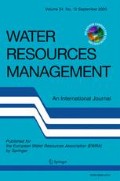Éva Pék, Imre Fertő, Stefania Giusti & Maher Salman
Published:
Abstract
The responsibility transfer of irrigation management from the state to farmers emerged as a mutually beneficial strategy to enhance food production while reducing pressure on central budgets. Yet the impacts of participatory approaches are not sufficiently investigated to understand the real-term gains of farmers. A systematic review combined with meta-analysis is undertaken to array what has been learned on the success of management transfer at the ground level. Based on the findings collated from 42 case studies in developing countries, the impact indicators of management transfer show an overall positive contribution to productivity, system efficiency, profitability, and cost of service, as direct proxies of farmers’ benefits. However, such impacts require the analysis of the research shortcomings. The existing literature fails to rebalance the geographical concentration of research interest, position management transfer in pro-poor contexts, explore the critical influence of water availability and craft a robust methodology for assessments. The paper revealed three key features of the assessments affecting the reported impacts. The assessments conducted long after the management transfer and the more recent assessments have a positive and significant relationship with the measured impacts. Conversely, the rigour of applied methodology has a negative and significant relationship with the impacts. The paper suggests research pathways to better understand the farmers-related impacts of management transfer, including the involvement of subsistence farms, application of pro-poor indicators, investigation of the implications of water scarcity, and the development of a framework for more rigorous assessments.
Keywords: Irrigation, Systematic review, Profit, Small-scale scheme, Research methodology



